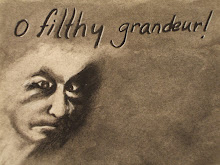This is going to be the first of many posts I would like to write about China Mieville. Currently, I'm reading his Iron Council, another novel of Bas-Lag. I would have read it by now, except I was saving it for when I absolutely needed to read what I knew would be an awesome novel. Besides, Mieville's latest novel won't be available to me for a couple of months yet. I have to ration them.
So, as I was reading the first couple of chapters of Iron Council I realized what it is that makes Mieville's novels so captivating: it's their realness. I know this seems like an oxymoron for fantasy stories to seem real, but if you've read King Rat, Perdido Street Station, or The Scar, then you'll know what I'm talking about. Though they are fantasy, these stories could almost be real, and it's all in how Mieville portrays them. They're not silly or dramatic like Eddings stories, and they're not about some wizards or some impossible skilled fighters. They generally deal with ordinary people (not archtypical heros with chiseled bodies wielding a sword that is impractical in real fighting) living in a world that could easily be real if only there were such a place as New Crobuzon, or real races like the vodyanoi or khepri. Of course, King Rat, takes place in the very real setting of London, and exists in a parallel plane of existence that centers around the subterranean world of rebelling rats who fear the Pied Piper. How are we, mere humans, to know that such a thing is not possible?
All of these stories have the potential to be real in how they're presented. In Mieville's worlds there is no clear division of good and evil. There are people, only people, who do good and bad things consciously or inadvertently. All people have their failings. All people should be approached with caution. Everyone is a potential enemy. And so, it is with caution that I read Mieville's works. Afterall, in Perdido Street Station, we are presented with a character whom we are meant to sympathize with from the beginning. He is a tragic figure, and only at the very end of the novel do we realize what a disgusting scoundrel he is, suddenly changing our perception that this character deserved his misery afterall, and suddenly we are left with the realization that you can't really assume anything about anyone, not even in books. Real people have motives, secrets; real people lie; real people sometimes mislead others; and it is real people that populate Mieville's novels. Even though we are following the main character, I must always ask, can this character be trusted? However, this question cannot be answered until the end of most stories, because Mieville is deceitful in his writing, and one cannot even tell where the story is going most of the time. It could be going in a straight line one moment toward one goal, and suddenly everything gets fucked up and no one can assume where the story is going to end. That's just beautiful. That's good writing.
Saturday, January 24, 2009
Reality in Fantasy
Posted by FilthyGrandeur at 1/24/2009 02:11:00 PM
Labels: China Mieville, iron council, king rat, perdido street station, scar
Subscribe to:
Post Comments (Atom)


2 comments:
See I love Mieville generally but I just couldn't get into the Iron Council and dropped it halfway through I was so disappointed. It just seemed so much ...blander compared to the two previous ones, maybe I should give it another go? I turned a friend onto Mieville who didn't enjoy the book either so I didn't feel that bad not finishing it.
i'm more than halfway through it right now. i love it because it follows the socialist themes of his other novels. i don't know how far you got, but the beginning is a little slow to start, but it's worth it to keep going. i think the problem is that he kind of just throws us into this one, almost expecting us to care about characters we know nothing about just yet, but eventually it picks up. the majority of the book follows Judah's story, but you don't even get to that until after you follow Cutter, then Ori for a while. trust me, it's just as amazing as the other ones, just give it a chance.
Post a Comment